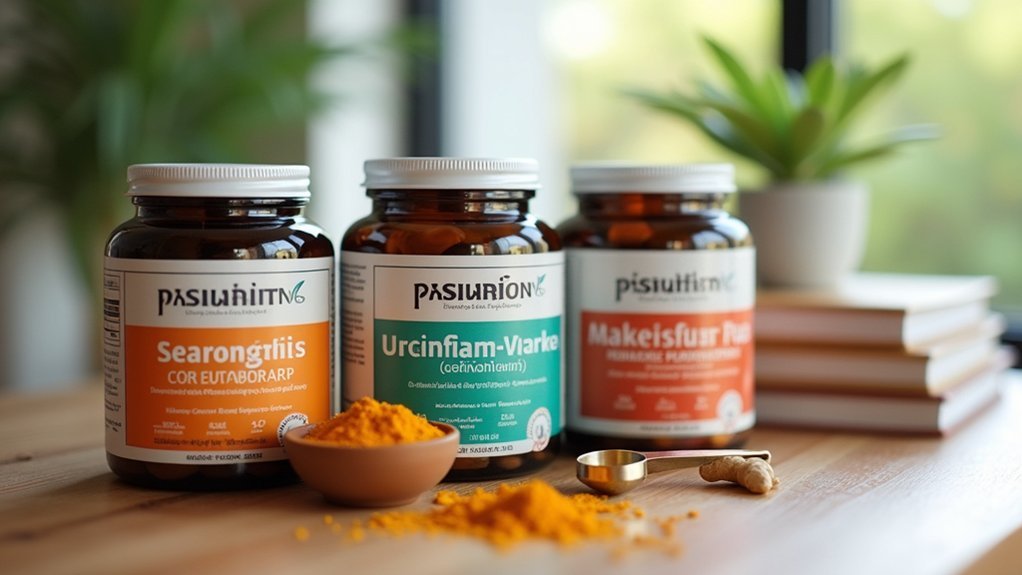You’ll reduce joint inflammation safely by choosing evidence-based supplements like omega-3 fatty acids, curcumin with black pepper, and vitamin D while following proper dosage guidelines. Always consult your healthcare provider first to check for medication interactions, especially with blood thinners. Select products with third-party testing and standardized extracts for consistent results. Monitor your body’s response closely, stay within recommended limits to avoid toxicity, and integrate supplements with dietary changes and physical activity for ideal joint health outcomes.
Choose Evidence-Based Supplements With Scientific Backing

When managing joint inflammation, you’ll want to focus on supplements that have solid scientific research backing their effectiveness.
Omega-3 fatty acids, particularly DHA, have demonstrated significant anti-inflammatory effects in clinical trials, reducing inflammatory markers throughout your body.
Curcumin stands out for its potent anti-inflammatory properties, with studies showing it’s sometimes as effective as NSAIDs for reducing joint pain and inflammation. However, curcumin is poorly absorbed on its own, so combining it with black pepper can significantly enhance its bioavailability.
You’ll also find strong evidence supporting zinc’s role in inflammation regulation and its ability to reduce oxidative stress in joints.
Green tea extract offers antioxidant benefits that help combat joint inflammation, while quercetin provides both anti-inflammatory and antioxidant properties.
Fish oil supplements remain a top choice due to their well-documented omega-3 content and proven anti-inflammatory effects.
Understand Proper Dosage Guidelines for Maximum Effectiveness
Your individual dosage needs depend on factors like your weight, health status, and the severity of your joint inflammation.
You’ll need to follow evidence-based supplement amounts that researchers have tested for safety and effectiveness, rather than guessing or taking random doses. Research studies typically use 500–2,000 mg of turmeric daily for therapeutic benefits.
It’s essential to monitor how your body responds over time and adjust accordingly, since what works for others mightn’t be the right amount for your specific situation.
Individual Dosage Requirements Vary
Although anti-inflammatory supplements offer promising benefits for joint health, determining the right dosage isn’t a one-size-fits-all approach. Your individual needs depend on multiple factors that greatly impact effectiveness and safety.
| Factor | Consideration | Impact on Dosage |
|---|---|---|
| Age & Weight | Body mass affects absorption | May require adjustment |
| Condition Severity | Mild vs. severe symptoms | Higher doses for severe cases |
| Medical History | Existing medications/conditions | Can alter requirements |
| Treatment Response | Effectiveness monitoring | May need increases/decreases |
| Duration of Use | Short-term vs. long-term | Adjustments over time |
You’ll need to take into account your current medications, underlying health conditions, and how your body responds to treatment. Take the smallest effective dose for the shortest duration necessary to minimize potential risks. Consulting your doctor guarantees you’re taking appropriate amounts while avoiding potentially dangerous interactions or side effects.
Evidence-Based Supplement Amounts
Five well-researched anti-inflammatory supplements have established dosage ranges backed by clinical studies, giving you concrete guidelines for joint health enhancement.
These evidence-based amounts help you navigate supplementation safely while maximizing therapeutic benefits for joint inflammation and pain management.
Clinical research provides specific dosing parameters:
- Vitamin D: 600-4000 IU daily for immune modulation and RA symptom relief
- Fish Oil: 2.6 grams daily showing significant RA improvements in studies
- Turmeric/Curcumin: 500-2000 mg daily for ideal anti-inflammatory effects
- Omega-3 Fatty Acids: High-dose protocols (54 mg/kg EPA, 36 mg/kg DHA) reducing joint pain
You’ll want to start with lower doses and gradually increase based on your tolerance and response.
These research-backed amounts serve as starting points, but you should always consult your healthcare provider before beginning any supplement regimen to guarantee safety and effectiveness. Vitamin C supports joint health by aiding in collagen formation, which is essential for maintaining healthy cartilage and connective tissue.
Monitor Effectiveness Over Time
While establishing proper dosages marks the foundation of effective supplementation, tracking your body’s response over time determines whether your anti-inflammatory regimen truly delivers the joint relief you’re seeking.
You’ll need consistent monitoring since supplement effectiveness varies dramatically among individuals due to absorption and metabolism differences. Keep a detailed symptom diary tracking joint pain and inflammation scores weekly. Consider using validated assessment tools like DAS-28 for rheumatoid arthritis to guarantee objective measurement.
Don’t overlook laboratory monitoring. Request periodic blood tests measuring inflammatory markers like ESR and C-reactive protein, plus kidney and liver function assessments. These biomarkers reveal systemic inflammation changes and detect potential adverse effects from prolonged use.
Adjust dosages based on both symptom improvement and side effects. If you’re experiencing gastrointestinal discomfort or minimal relief after several weeks, reevaluate your approach immediately. Standardized research methodologies help ensure accurate interpretation of your supplement’s effectiveness and provide reliable benchmarks for comparison.
Check for Potential Interactions With Current Medications
Before adding any anti-inflammatory supplements to your joint care routine, you’ll need to check if they interact with your current medications, especially blood thinners like warfarin.
Many popular supplements can create dangerous conflicts with prescription drugs, potentially increasing bleeding risks or reducing your medication’s effectiveness. Nearly 25% of U.S. adults take both prescription medications and dietary supplements, making these interactions a common concern.
That’s why you should always consult your healthcare provider before starting any new supplement regimen.
Blood Thinner Interactions
If you’re taking blood thinners like warfarin, apixaban, or rivaroxaban, certain anti-inflammatory supplements can create dangerous interactions that either increase your bleeding risk or reduce your medication’s effectiveness.
Common supplements that enhance bleeding risk include:
- Fish oil and garlic supplements – contain compounds that thin blood and impair clotting
- Ginkgo biloba – inhibits platelet aggregation, compounding anticoagulant effects
- NSAIDs like ibuprofen – substantially increase serious bleeding events when combined with blood thinners
- Turmeric with black pepper extract – piperine inhibits liver enzymes that metabolize warfarin
Always consult your healthcare provider before starting any anti-inflammatory supplement.
They’ll need to monitor your blood coagulation parameters and may adjust your medication dosage. Be particularly cautious with vitamin E supplements as they can also increase bleeding risk when combined with blood thinners.
Disclose all supplements you’re considering to avoid potentially life-threatening interactions.
Prescription Drug Conflicts
Beyond blood thinners, many prescription medications you’re already taking can interact dangerously with anti-inflammatory supplements, creating unexpected side effects or reducing your medication’s effectiveness.
NSAIDs combined with blood pressure medications may reduce their effectiveness, while liver-toxic drugs paired with certain herbs increase hepatotoxicity risk. If you’re taking immunosuppressants like methotrexate, avoid supplements that could alter your immune response or stress your liver further.
Pay special attention to high-risk supplements like St. John’s Wort, which affects multiple drug metabolism pathways, and Ginkgo Biloba, which increases bleeding risk with antiplatelet drugs.
Even seemingly harmless turmeric can interfere with chemotherapy treatments. Unfortunately, only about 25% inform healthcare providers about their supplement use, which prevents doctors from identifying potentially dangerous interactions. Always consult your pharmacist or doctor before adding any supplement to your regimen, especially if you’re taking multiple medications.
Healthcare Provider Consultation
While you might feel confident managing your supplement routine independently, scheduling a consultation with your healthcare provider remains the most critical step when introducing anti-inflammatory supplements to your regimen.
Your doctor can identify dangerous interactions that aren’t obvious, such as ginkgo biloba enhancing bleeding risks when combined with anticoagulants, or NSAIds causing kidney problems with ACE inhibitors.
During your consultation, discuss:
- Current medications – including prescription drugs, over-the-counter medications, and existing supplements
- Medical history – particularly bleeding disorders, kidney disease, or gastrointestinal issues
- Specific supplements – dosages and timing you’re considering
- Monitoring plan – how to watch for adverse effects or interactions
Your provider can recommend safer alternatives like curcumin or omega-3 fatty acids while ensuring proper dosing. Regular communication with your healthcare team throughout your supplementation journey helps maintain safety and allows for adjustments as your health needs change.
Select High-Quality Products From Reputable Manufacturers
When you’re shopping for anti-inflammatory supplements to support joint health, the quality and reputation of the manufacturer can make the difference between effective relief and wasted money.
Look for products with NSF, USP, or cGMP certification to guarantee proper manufacturing standards. Third-party testing results should be publicly available, confirming ingredient accuracy and absence of contaminants like heavy metals.
Quality certifications like NSF, USP, or cGMP plus transparent third-party testing separate legitimate supplements from questionable products.
Choose manufacturers with clear ingredient lists and specific dosages—avoid proprietary blends that hide amounts. Research the company’s history, industry recognition, and customer service accessibility.
Check for regulatory warnings or recalls in their past. Prioritize scientifically validated ingredient forms like liposomal curcumin or standardized extracts that enhance bioavailability. When evaluating omega-3 supplements, verify that EPA and DHA content is clearly labeled, as these are the primary anti-inflammatory compounds that provide joint support benefits.
These factors help guarantee you’re investing in supplements that deliver real anti-inflammatory benefits.
Monitor Your Body’s Response and Side Effects

How can you tell if your anti-inflammatory supplements are helping or harming your body? Pay close attention to your body’s signals, especially during the first few weeks of supplementation.
Early warning signs shouldn’t be ignored, as they often indicate potential complications.
Watch for these key symptoms:
- Digestive issues – nausea, heartburn, stomach pain, or persistent diarrhea lasting more than a few days
- Kidney problems – changes in urination patterns, swelling, or fluid retention
- Allergic reactions – skin rash, itching, difficulty breathing, or throat swelling
- Neurological effects – dizziness, confusion, persistent headaches, or ringing in your ears
If you experience any concerning symptoms, discontinue use immediately and consult your healthcare provider. Be particularly vigilant for signs of stomach ulcers, which can develop as a serious complication of anti-inflammatory use.
This is especially important if you’re over 65 or have pre-existing health conditions.
Consult Healthcare Professionals Before Starting New Regimens
Before you add any anti-inflammatory supplement to your routine, consulting with a healthcare professional isn’t just recommended—it’s crucial for your safety.
Healthcare professionals conduct thorough assessments of your medical history, current medications, and chronic conditions to prevent dangerous interactions. They’ll evaluate supplements like ginger, omega-3 fatty acids, and curcumin, which can increase bleeding risks when combined with blood thinners.
Your doctor will provide personalized recommendations based on your specific health needs and family history. They’ll help you understand potential allergies, sensitivities, and effectiveness for your joint health goals. Natural supplements can assist your body in combating pain and inflammation while potentially helping prevent long-term complications of chronic inflammation, such as cancer.
Through shared decision-making, you’ll receive accurate education about various supplements while managing risks appropriately. Regular monitoring guarantees your regimen remains safe and effective as your health evolves.
Prioritize Standardized Extracts for Consistent Results

While many anti-inflammatory supplements flood the market with varying quality claims, standardized extracts offer the reliability your joint health deserves.
These products contain specific, measurable amounts of active compounds, ensuring you’re getting consistent dosing with each capsule. Non-standardized supplements can vary dramatically in potency, making effective treatment unpredictable.
Standardized extracts provide several key advantages:
- Consistent therapeutic effects – You’ll experience more predictable inflammation relief and joint function improvements
- Enhanced bioavailability – Many include absorption enhancers like piperine for better uptake
- Reduced batch variability – Each bottle contains the same potency as the last
- Clear labeling – You’ll know exactly what active compounds you’re consuming
Look for products displaying standardization percentages or specific marker compounds on their labels. Purchasing from manufacturers with certified cGMP facilities ensures proper quality control and manufacturing standards for your joint health supplements.
Enhance Bioavailability Through Proper Supplement Combinations
You can dramatically increase your supplement absorption by choosing the right combinations and timing strategies.
Pairing curcumin with black pepper extract boosts bioavailability by up to 2000%, while taking fat-soluble vitamins with healthy fats guarantees proper absorption. Clinical studies confirm these combinations remain safe and well-tolerated even at higher dosages for joint health applications.
Strategic timing separates competing nutrients and maximizes each supplement’s effectiveness for joint health.
Curcumin With Black Pepper
When you take curcumin alone, your body absorbs only a fraction of its potential benefits due to poor bioavailability. The compound gets rapidly metabolized by your liver before reaching therapeutic levels in your bloodstream.
However, you can dramatically enhance curcumin’s effectiveness by pairing it with black pepper.
The piperine in black pepper increases curcumin absorption by up to 2,000% through two key mechanisms: it helps curcumin pass through your intestinal wall more easily and slows down liver breakdown. This powerful combination transforms curcumin into a highly bioavailable anti-inflammatory compound.
You can also improve absorption by taking curcumin with healthy fats like nuts, avocado, or fish oil, which allow the compound to bypass liver metabolism and enter your bloodstream directly.
Consider these proven strategies:
- Add 1/20 teaspoon of black pepper to turmeric
- Choose supplements combining 20mg piperine with 2g curcumin
- Look for encapsulated formulations for enhanced stability
- Select products specifically designed for joint inflammation support
Fat-Soluble Vitamin Pairing
Fat-soluble vitamins like D, E, A, and K require dietary fats for ideal absorption, making proper pairing essential for maximizing their anti-inflammatory potential in your joints.
You’ll enhance bioavailability by taking these supplements with healthy fats like nuts, seeds, or fatty fish. Vitamin D and E combinations particularly excel at reducing joint inflammation by targeting both immune function and oxidative stress pathways simultaneously.
Consider pairing vitamin A with D to support immune health while addressing deficiencies that contribute to inflammation. Vitamin E acts as a powerful antioxidant that specifically protects your cells from free-radical damage that can worsen joint inflammation.
However, you must respect safety limits: keep vitamin D below 4,000 IU daily and vitamin A under 3,000 RE to avoid toxicity.
Omega-3 fatty acids complement these vitamins perfectly, improving absorption while providing additional anti-inflammatory benefits for your joints.
Timing for Maximum Absorption
Since absorption rates vary dramatically based on timing and meal composition, strategic supplement scheduling can double or even triple your anti-inflammatory benefits for joint health.
You’ll maximize bioavailability by taking fat-soluble supplements like curcumin with your largest, most balanced meal of the day.
Here’s how to optimize your timing:
- Take with fatty meals – Fat enhances solubility and prevents stomach irritation
- Combine turmeric with black pepper – Piperine increases curcumin absorption by up to 2000%
- Avoid high-fiber meals – Fiber can bind supplements and reduce absorption
- Space from competing nutrients – Stagger calcium and curcumin to prevent absorption interference
Evening or mealtime intake aligns with your body’s metabolic rhythm, supporting better antioxidant utilization while reducing inflammation more effectively. Consider adding quercetin-rich foods like apples, onions, or berries to potentially enhance turmeric’s anti-inflammatory effects even further.
Avoid Excessive Intake to Prevent Vitamin Toxicity
While anti-inflammatory supplements can considerably benefit joint health, you must stay within recommended dosage limits to prevent serious vitamin toxicity.
Fat-soluble vitamins like vitamin D and E accumulate in your body, making toxicity possible with excessive intake. You’ll want to stay below 4,000 IU daily for vitamin D and 1,000 mg for vitamin E to avoid dangerous side effects.
Watch for toxicity symptoms including nausea, vomiting, muscle weakness, confusion, and kidney stones. Vitamin D toxicity causes hypercalcemia, leading to severe health complications.
Don’t exceed recommended dosages, even if you think more will provide better results. Working with a registered dietitian ensures you receive tailored supplementation plans that account for your individual health needs and existing medications.
You should get regular blood tests to monitor vitamin levels and consult healthcare professionals before taking higher doses. This monitoring helps identify imbalances early and prevents serious complications.
Integrate Supplements as Part of a Comprehensive Treatment Plan
Although anti-inflammatory supplements offer significant benefits for joint health, they work most effectively when you integrate them into a complete treatment strategy rather than relying on them as standalone solutions.
You’ll achieve ideal results by combining supplementation with extensive lifestyle modifications that address inflammation from multiple angles. This holistic approach enhances the anti-inflammatory effects of quercetin, omega-3s, ginger, curcumin, and vitamin D while promoting overall joint wellness.
Your all-encompassing treatment plan should include:
- Dietary modifications – Reduce processed foods and incorporate anti-inflammatory nutrients
- Regular physical activity – Engage in exercises that complement supplement benefits
- Stress management techniques – Implement practices that reduce inflammatory responses
- Professional monitoring – Work with healthcare providers to adjust treatments based on progress
Remember that supplements should not replace conventional medical treatments but rather complement them as part of your comprehensive approach to managing joint inflammation.
This integrated approach maximizes supplement efficacy while addressing underlying inflammatory triggers.
Frequently Asked Questions
How Long Should I Take Anti-Inflammatory Supplements Before Expecting Noticeable Results?
You’ll typically notice results from anti-inflammatory supplements within weeks to months. Glucosamine needs several months, turmeric shows effects after three months, while omega-3s work faster within weeks of consistent use.
Can I Take Joint Supplements if I’m Pregnant or Breastfeeding?
You shouldn’t take joint supplements during pregnancy without consulting your doctor first. While glucosamine appears relatively safe during breastfeeding, there’s limited safety data for pregnancy, so medical guidance is essential.
Are There Specific Foods That Enhance or Reduce Supplement Effectiveness?
Yes, you’ll enhance supplement effectiveness by eating fatty fish, leafy greens, and colorful fruits while avoiding processed foods, refined sugars, and trans fats that increase inflammation and counteract benefits.
What’s the Difference Between Synthetic and Natural Forms of These Supplements?
Natural supplements come from whole food sources and contain additional nutrients that enhance absorption, while synthetic versions are lab-created to mimic natural structures but often lack the complexity for ideal bioavailability.
Should I Stop Taking Supplements Before Surgery or Medical Procedures?
You should stop most supplements at least two weeks before surgery. They can increase bleeding risks and interact with anesthesia. Always disclose everything you’re taking to your healthcare provider for safety.
In Summary
You’ll achieve the best results by implementing these evidence-based supplementation strategies consistently. Remember, you’re not just taking supplements—you’re creating a thorough approach to joint health. Don’t expect overnight miracles, but you’ll likely notice improvements within weeks when you combine quality products with proper dosing. Stay patient, monitor your body’s response, and you’ll be on track to healthier, more comfortable joints long-term.





Leave a Reply